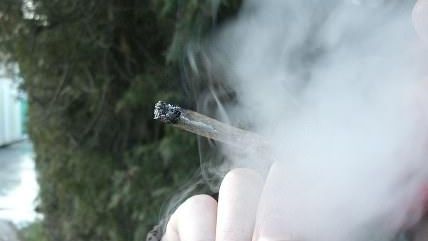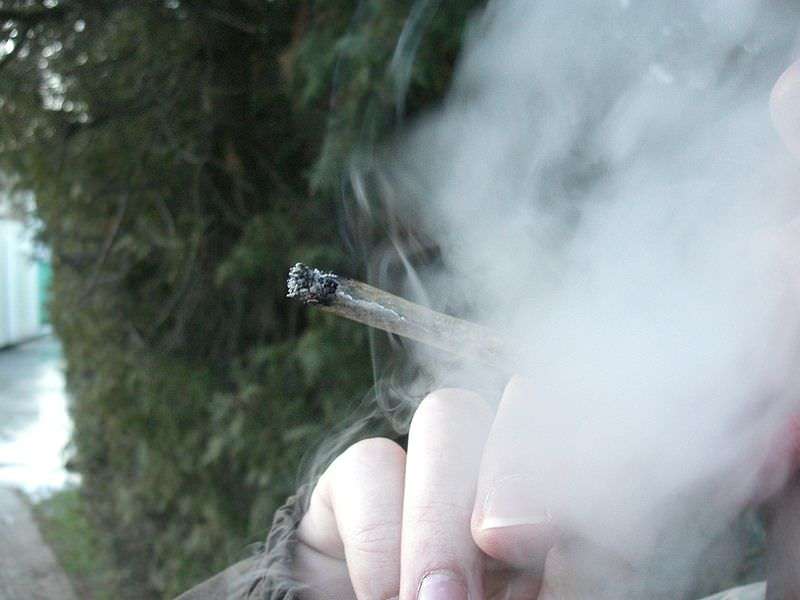If High Cigarette Taxes Fuel a Booming Black Market, What Will High Marijuana Taxes Do?


In Colorado, lawmakers see gold in them thar buds — dope, that is. Green gold. And, while it's true that marijuana can be a lucrative product, legislators think money can be made by taxing the hell out of the stuff. Colorado law requires voter approval for any such levy, but at least some legislators think they can get the public to go along with a hefty tariff, apparently out of their sense of civic good. If they succeeed, though, the example of cigarette taxes suggests a likely outcome: a booming black market.
From the Coloradoan:
DENVER — Marijuana as a potential tax bonanza has Colorado lawmakers wrestling with a question both sides say they don't know how to answer: How much will people pay for legal weed?
The state House advanced a taxing measure Monday to levy a pot tax in excess of 25 percent, a reduction from the 30 percent rate lawmakers considered last week.
The proposal sparked a lively floor debate over the proper tax rate for a drug that's never been taxed before. Democrats argued that voters want high pot taxes, and that consumers will gladly pay a premium for the assurances that would come from a regulated and legal drug supply.
I'm always a little intrigued by politicians who insist that their constituents really want to pay high taxes on the goods they buy — especially in a state where voters approved a taxpayers bill of rights that put tight limits on just how deep government officials could reach into their pockets. But convinced of the wisdom of high taxes, they are. and never mind that similar levies on cigarettes have led to a booming black market as smokers go on the hunt for cheaper smokes. As Michael D. LaFaive and Todd Nesbit, Ph.D., wrote for the Mackinac Center in the summary of a report on the effect of cigarette taxes:
Cigarette taxes have been in the news lately, and not just because politicians keep raising them. What's new is that state and local levies have grown so onerous in some parts of the country that they almost could be called "prohibition by price." And like other forms of prohibition, this one has led to a spike in smuggling-related criminal activity as smokers turn to illicit distribution channels.
At the extreme is highly taxed New York, "with smuggled cigarettes totaling a staggering 60.9 percent of the total market." That's a market for a perfectly legal product dominated by black market sales.
Some Colorado legislators seem aware that the road to oodles of pot-derived tax revenue might not be as smooth as they might hope. The Coloradoan piece adds:
Other Republicans noted that marijuana taxes would be in addition to hefty licensing and application fees to enter the business. The result, they feared, could be the retention of a black market for pot. The measure approved by voters last year allows not just retail pot sales, but also home marijuana growing, raising the specter of plentiful homegrown weed to compete with the taxed marijuana.
"The consensus has always been that the industry needs to pay for itself … but whether we like it or not, there's already an entrenched black market in place," said Rep. Dan Nordberg, R-Colorado Springs.
Well … duh. Marijuana, traditionally sold through illicit means, would seem to be at least as prone as cigarettes to healthy sales on the black market in response to taxes. If high taxes in New York can drive a majority of sales of cigarettes to the tax-free black market, just how much revenue do Colorado lawmakers think they're going to collect by trying to mug marijuana buyers?
Editor's Note: As of February 29, 2024, commenting privileges on reason.com posts are limited to Reason Plus subscribers. Past commenters are grandfathered in for a temporary period. Subscribe here to preserve your ability to comment. Your Reason Plus subscription also gives you an ad-free version of reason.com, along with full access to the digital edition and archives of Reason magazine. We request that comments be civil and on-topic. We do not moderate or assume any responsibility for comments, which are owned by the readers who post them. Comments do not represent the views of reason.com or Reason Foundation. We reserve the right to delete any comment and ban commenters for any reason at any time. Comments may only be edited within 5 minutes of posting. Report abuses.
Please to post comments


A friend is the legalize and tax the Hell out of it camp. He just could not take the reasoning to the next level.
Maybe they could reinstate the Marijuana Tax Act of 1937 and we could start all over again.
Weed--even very good weed--is not that expense to produce. Even with a supply chain mark-up, I can't see it hitting the store shelves at anything like street prices--unless they tax it up to street prices. Even then, it's legal which still makes it a pretty good deal.
35% sales tax is outrageous, but if it's on $5 worth of legal weed that had a black market value of $40, it's not going to stimulate a black market.
Agreed, but since the legislature is creating a weed cartel. The prices will be set high even before taxes.
The result, they feared, could be the retention of a black market for pot. The measure approved by voters last year allows not just retail pot sales, but also home marijuana growing, raising the specter of plentiful homegrown weed to compete with the taxed marijuana.
That's some nice subtle conflation ya got going there. Home grown marijuana will indeed compete with taxed marijuana, but that's not the black market any more than I'm participating in a black market when I eat tomatoes I grew myself. So why does that sentence immediately follow a remark about a feared black market? Can't tell if it's bad writing or willful bias.
Next up: Pearl clutching scare story as reporter discovers just how incredibly easy it is to grow your own.
Honestly, legalization without grow-your-own is weak half-ass legalization, but considering the hard on politicians get when thinking about the tax revenue, I'm very impressed Colorado got it passed with that provision.
What the reporter doesn't realize is that home grown weed is what will keep the real black market at bay.
I think the point was that legal home-grown weed means a plentiful supply for any black market
If it's being provided for a black-market it ceases to be "legal."
As in "you can't home grow for money," which is the vernacular for what the amendment said.
Heck yeah dude now thats what I am talking about.
http://www.GoGetAnon.tk